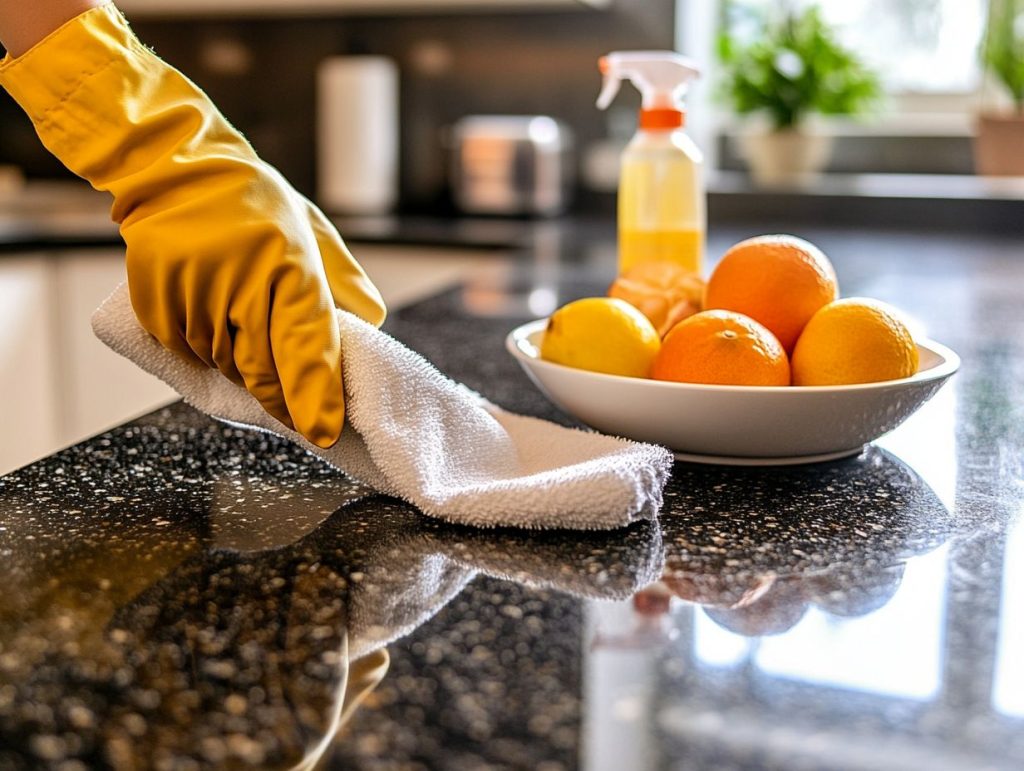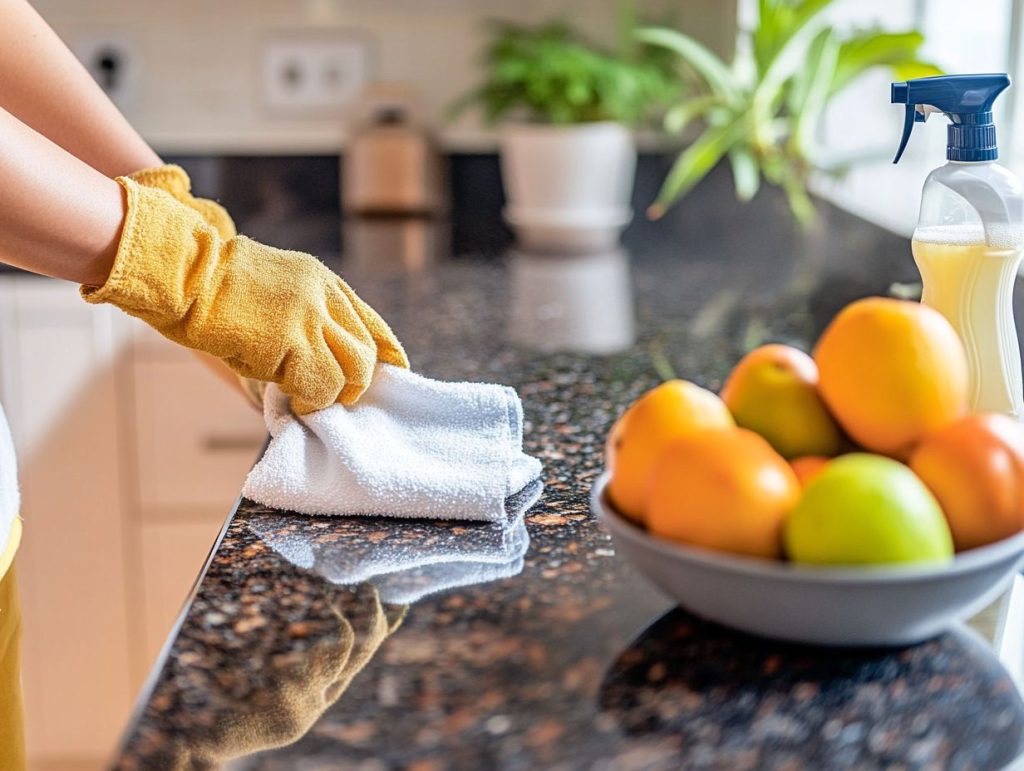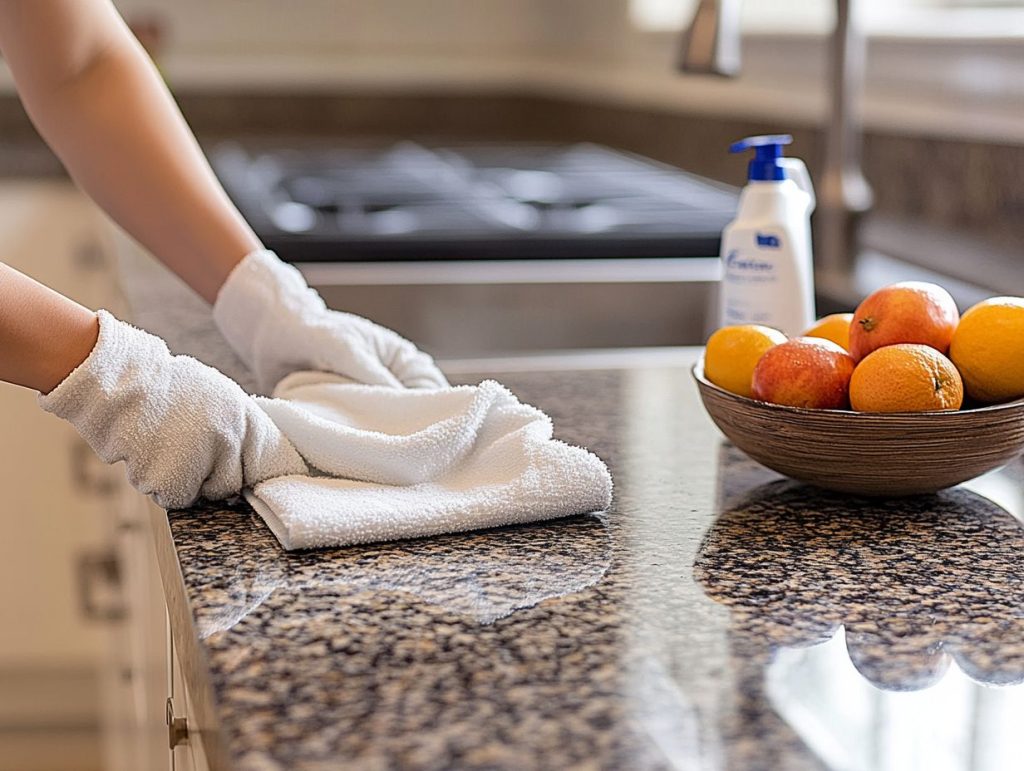The problem with kitchen countertops is that they look sturdy and durable, which makes people careless about maintenance. Keeping them clean and damage-free can be challenging, especially with materials like granite, marble, and quartz.
This guide will cover the best cleaning methods tailored to each countertop surface, basic techniques everyone can use, and eco-friendly alternatives to harsh chemicals.

Kitchen Countertop Surfaces And How They Should Affect Your Approach To Cleaning
Understanding your kitchen countertop material is crucial for keeping it looking great and lasting longer. Surfaces like granite, quartz, and laminate each need their special care when it comes to cleaning.
Each material has quirks that affect how you should clean it, what products to use, and what precautions to take to avoid damage. Knowing the characteristics of these surfaces will help you maintain a pristine and functional kitchen, ensuring your food prep area stays safe and hygienic.
Let’s delve into the details of each material and their specific cleaning needs.
Determining the Best Cleaning Method
Determining the best way to clean your kitchen worktops begins with understanding the specific needs of the material and the types of stains or spills you may encounter. Some surfaces require gentle cleaners, while others can withstand a good scrub. By taking a moment to assess the surface and the grime, you can select cleaning solutions that protect the integrity and shine of your worktops. This way, you keep everything clean and durable without risking any damage.
For instance, using a pH-balanced cleaner is vital to maintaining the unique finish of natural stone. Conversely, laminate surfaces can tolerate a bit more scrubbing without getting scratched.
Choosing non-toxic cleaning agents creates a safe environment for your family and enhances your cleaning efforts by removing stains without leaving harmful residue behind. As you explore your options, consider the long-term effects of your choices on both the cleanliness and the longevity of your surfaces. Striking a balance between effectiveness and safety is the key to achieving your desired pristine kitchen appearance.

Basic Cleaning Techniques for All Countertop Surfaces
Basic cleaning techniques for all countertop surfaces are crucial for daily maintenance and can help extend the life of your kitchen worktops. To tackle everyday grime and spills effectively, grab a simple combination of warm water, mild soap, and a microfibre cloth.
It’s all about getting into a routine that includes gentle scrubbing and using the right techniques to keep those surfaces residue-free and shining like new. Sticking to a consistent cleaning schedule prevents stains from building up and keeps your kitchen hygiene at its best.
Using Gentle Cleaners and Tools
Using gentle cleaners and tools is key to keeping your kitchen worktops looking their best. These surfaces need a bit of TLC—harsh chemicals and abrasive scourers can cause unsightly scratches and dull finishes.
A pH-balanced washing-up liquid mixed with warm water is a solid choice for routine cleaning. If you want to disinfect, a mild vinegar solution does the trick without risking any damage. Soft microfibre cloths are your best friends here; they trap dirt without leaving lint behind, ensuring everything looks polished.
If you’re feeling ambitious, silicone-based sealers can provide an extra layer of protection, making it easier to wipe away spills and stains. With these simple strategies, you can keep your kitchen surfaces visually appealing and durable for the long haul.

Specialised Cleaning for Specific Countertop Materials
Specialised cleaning for different countertop materials is key to tackling each surface’s unique challenges. For example, you’ll want to use specific cleaning agents for granite and quartz to prevent discolouration, whilst marble requires a bit more TLC to avoid etching from acidic cleaners.
By understanding each material’s specific needs, you can choose the right cleaning methods and products to deal with stains and keep the surface intact. This tailored strategy helps ensure your countertops remain in top-notch condition, boosting their durability and appearance.
Tips for Granite, Marble, Quartz, and Other Materials
A few specific cleaning tips can make a difference in keeping granite, marble, quartz, and other materials beautiful and functional. Stick to a mild washing-up liquid for your granite and steer clear of acidic cleaners. If it’s marble, always opt for non-abrasive products that won’t damage that lovely surface finish. Quartz is low-maintenance, but you’ll want to clean it regularly to avoid stains. Following these tailored tips helps your worktops last longer and keeps them looking their best.
Understanding the unique properties of each material is essential for effective worktop maintenance. For example, granite can soak up stains if it isn’t sealed properly, so regular sealing is a must to protect that porous surface. Marble, being softer and more prone to scratches, needs a gentle touch; using a dedicated marble cleaner is a great way to keep its polished look.
And while quartz is designed for durability, avoiding harsh chemicals will help it retain its shine. By recognising these challenges and applying targeted solutions, you can enjoy the elegance of your worktops for years to come.
Preventing Damage to Your Countertops
Keeping your worktops in good condition is key to maintaining their appearance and functionality. Chopping boards, coasters, and trivets can make a significant difference by protecting those surfaces from wear and tear.
Furthermore, tackling spills immediately and avoiding harsh chemicals will help keep your worktops intact. By being mindful of how you use and care for your kitchen surfaces, you can seriously extend their lifespan and reduce the need for repairs.
Proper Maintenance and Care
Proper maintenance and care are key to extending the life of your kitchen worktops while keeping them beautiful and functional. Regular cleaning and surface treatment can help prevent discolouration and damage, and knowing how often to clean each material makes a difference. Adding effective maintenance tips to your cleaning routine ensures that your worktops look fantastic and are well-protected from common kitchen hazards.
Different worktop materials have their own maintenance needs. For instance, you should clean granite weekly with a pH-balanced cleaner and reseal it yearly to keep that shine and protect against stains. Quartz worktops, on the other hand, need a simple wipe-down with soap and water daily to avoid any build-up. As for hardwood surfaces, you’ll want to treat them with oil regularly and do a deep clean now and then to prevent warping and dryness.
Establishing a solid cleaning schedule is extremely important. It not only maintains the aesthetic appeal but also boosts the durability of your surfaces. Following these tailored cleaning tips can keep your kitchen looking pristine.
Eco-Friendly and Natural Cleaning Solutions
Using eco-friendly and natural cleaning solutions is a clever way to keep your kitchen worktops in tip-top condition without risking your family from harmful chemicals. You can whip up effective yet gentle cleaners with simple ingredients like vinegar, bicarbonate of soda, and castile soap.
These alternatives keep your kitchen safe and help reduce your environmental footprint, making them perfect for daily maintenance and deep cleaning sessions. You ensure your food preparation area stays clean and healthy by opting for safe cleaning products.
Safe and Effective Alternatives to Harsh Chemicals
Finding safe and effective alternatives to harsh chemicals is essential for keeping your kitchen environment healthy while achieving excellent cleaning results. Natural solutions like diluted vinegar, bicarbonate of soda paste, and soap can tackle tough stains without risking your household’s health.
By choosing non-toxic cleaning options, you ensure your food preparation area remains safe for your family while effectively cutting through grime and disinfecting surfaces. This not only protects your worktops but also enhances your kitchen hygiene.
Exploring these eco-friendly choices creates a tranquil space where chemical sensitivities are minimised, making cooking much more enjoyable. For example, a simple mix of water and lemon juice can be a lovely-smelling alternative to commercial disinfectants, and a bicarbonate of soda and water scrub works wonders on those stubborn residues.
Additionally, essential oils can bring delightful scents and extra antibacterial properties to your cleaning routine. Engaging in DIY cleaning projects saves you money and equips you with the know-how to maintain a clean and healthy environment at home, making the whole experience truly fulfilling.
